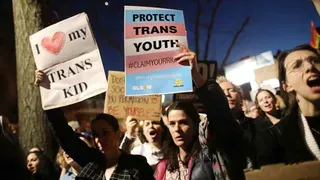September 28, 2020
Ambassadors Appeal for Acceptance of LGBT People in Poland
Vanessa Gera READ TIME: 2 MIN.
Ambassadors to Poland from some 50 countries and international organizations have expressed their support for the LGBT community in the country, citing a need to work for "non-discrimination, tolerance and mutual acceptance."
The appeal, made in an open letter published Sunday, comes as an increasingly visible LGBT community in Poland has faced a backlash from the right-wing government, many local communities and the Catholic church.
"Human rights are universal and everyone, including LGBTI persons, are entitled to their full enjoyment," the letter said, using the acronym for lesbian, gay, bisexual, transgender and intersex people.
Some of Poland's leaders, including the president and lawmakers from the ruling party, have cast the movement for civil rights for LGBT people as a threat to traditional families. President Andrzej Duda won a second term this summer after calling LGBT rights an "ideology" more dangerous than communism.
Meanwhile, dozens of towns in conservative parts of eastern and southern Poland have passed resolutions over the past nearly two years declaring themselves to be free from "LGBT ideology" or expressing support for families described as centered on unions between a man and woman.
"Human Rights are not an ideology – they are universal," U.S. Ambassador Georgette Mosbacher tweeted. "50 Ambassadors and Representatives agree."
Joachim Brudzinski, a top member of the ruling Law and Justice party who is now a lawmaker to the European Parliament, shot back at Mosbacher on Monday, saying "we in Poland also agree."
"Therefore, we are waiting with hope for the next letter, this time in defense of murdered Christians, imprisoned #ProLife activists, people dismissed from work and persecuted for quoting the Bible, people subjected to euthanasia against their will," he wrote on Twitter.
It was not exactly clear what Brudzinski was referring to. Poland is a predominantly Catholic nation where Christians do not face persecution and where abortion is illegal in most cases and euthanasia is outlawed.
The ambassadors' letter paid tribute to the work of the LGBT community in Poland as it seeks to raise awareness about the challenges its faces. The rise in hostility has led many to live in anger and fear or even to emigrate from their homeland.
Many activists say their greatest priority now is to get legislation passed criminalizing violence against people based on their sexual identity. The lack of such legislation means that attacks on LGBT people are not currently documented in police statistics.
The letter was signed by the ambassadors of the United States, many European countries, including Germany, Ukraine and the United Kingdom, as well as further off nations like Japan and Australia.
It was also signed by representatives in Poland of the United Nations, the European Union, the Organization for Security and Cooperation in Europe and the Community of Democracies, which is based in Warsaw.







